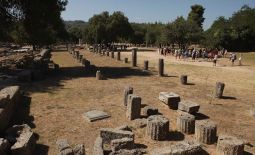What did the ancient Olympic Games look like?
Photo: olympics.com
The ancient Olympic Games represent a fascinating cultural and sporting legacy that has left a lasting impact on the world. Held every four years in Olympia, these games were part of a larger religious festival dedicated to the god Zeus.
Here are some facts about the Ancient Olympic Games:
- All athletes competed nude.
- Wrestlers and participants in pankration (a type of mixed martial arts combining boxing and wrestling) fought covered in oil.
- Physical punishment awaited those who started early on the track.
- In pankration, there were only two rules: no biting and no eye gouging.
- Boxers were advised to avoid attacks on the male genitalia.
- There were no points, time limits, or weight classes in boxing.
- Fighters had to signal surrender by raising their index finger — sometimes they would die before they could do so.
- Unseparable fighters could opt for a climax system, where one wrestler would get a free hit, then the other, with coin tosses deciding who would attack first.
History and Origin
The first recorded Olympic Games date back to 776 BCE. Although many legends surround their origin, historical evidence suggests they were created as a means of religious and social unification among Greek city-states. The games were held at a sacred site in southern Greece, with athletes coming from all over Greece to compete.
Disciplines and Competitions
Initially, the games included only one event—a stadion race, a sprint approximately 192 meters long. Over time, they expanded to include other disciplines such as wrestling, boxing, pentathlon, and chariot racing. Each event demanded exceptional physical fitness and skill.
Cultural and Social Aspects
The ancient Olympic Games were more than just a sporting event. They served as an occasion for gathering, peace treaties, and exchange of cultural and political ideas. The Olympic Peace (ekecheiria) declared during the games allowed safe travel for spectators and athletes from all Greek regions.
Legacy and Significance
The games were discontinued in 393 AD by the Roman emperor Theodosius I, but their memory persisted through myths and written records. They experienced a revival in 1896 when the modern Olympic Games were launched in Athens, inspired by the spirit of antiquity.
Today, the Olympics stand as a symbol of international friendship, fair play, and competition that unites people worldwide. The ancient games, with their rich tradition and cultural significance, form the foundation of this global phenomenon.



